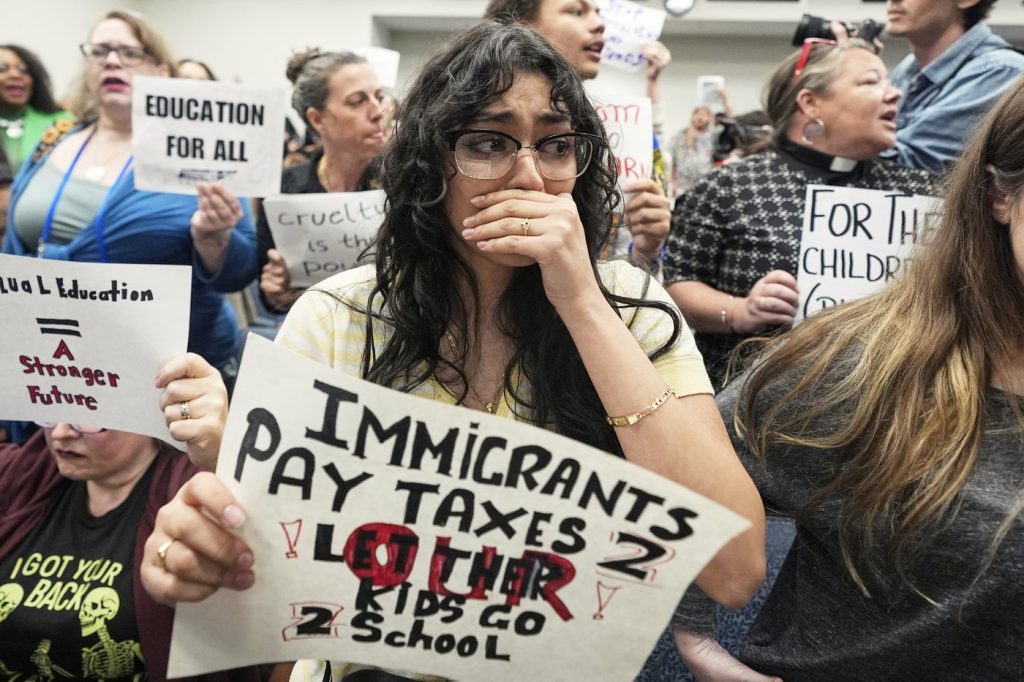NASHVILLE, Tenn. Damian Felipe Jimenez, a sixth grader, envisions a future in which he could become a restaurant owner, a scientist, or pursue other dreams. As he navigates through his education, he fears that a critical pathway to realizing those dreams could vanish for him and some of his classmates. He, along with hundreds of other children, has rallied at the Tennessee Capitol to protest legislation aiming to dismantle the U.S. constitutional right to free public education for all children, regardless of their immigration status. This right was established by the landmark 1982 U.S. Supreme Court case Plyler v. Doe, which struck down a Texas law that attempted to bar students without legal admission from enrolling in public schools.
Felipe Jimenez, the son of immigrant parents, passionately addressed lawmakers about the implications of the proposed legislation on his peers, stating, “Just like me and all the kids in this country, we have the right to dream and make those dreams come true. The right to an education should not be taken away from us because of our immigration status.” A rising number of conservative leaders, motivated by groups like The Heritage Foundation, have been pushing states to overturn Plyler v. Doe. Tennessee’s Republican lawmakers seem particularly eager to advance legislation that challenges this Supreme Court decision, potentially igniting a legal conflict that supporters hope will escalate to the nation’s highest court.
In the wake of former President Donald Trump’s reelection and his aggressive policies regarding illegal immigration, GOP-led states have introduced numerous anti-immigration bills. Nevertheless, few have attempted to revoke educational access for children, and none have progressed beyond committee stages, with Tennessee being a notable exception.
The Tennessee Senate has passed a proposal that necessitates proof of legal residency for enrollment in public K-12 schools. Schools would either have the authority to deny admission to students without proper documentation or charge tuition. The House version varies in that it allows schools to check immigration status but does not mandate it. A reconciliation between the two proposals is needed before it can be sent to Republican Governor Bill Lee. If enacted, the legislation is likely to face legal challenges.
The proposal's sponsors tend to downplay the ramifications of denying education to children, instead emphasizing the financial burdens states encounter when educating children without legal immigration status. Republican Sen. Bo Watson, a chief proponent of the bill, stated, “It’s been argued that undocumented illegal aliens pay sales tax and property tax. True. But one doesn’t know if those payments come close to offsetting the additional costs. We argue they do not.” However, the exact number of undocumented children living in Tennessee remains unknown, and it’s uncertain if the proposed law would result in any actual savings. The economic arguments made by Texas in the Plyler case were ultimately dismissed by the court.
Conservative supporters of the bill frequently highlight the narrow 5-4 decision that upheld Plyler, arguing that this creates an opportunity for its reversal, particularly given the current Supreme Court's willingness to overturn established precedents. Brett Geier, a professor at Western Michigan University, commented on the conservative inclination within the court, remarking, “Where does it come from? It starts with the states.”
The fight over educational access isn’t just a legal matter; it’s deeply personal for many students. Over the months, emotions have flared among those opposing the legislation, with students often expressing distress at the thought of classmates being barred from their schools. Twelve-year-old Silvestre Correa Del Canto stood alongside his mother at the Capitol, alarmed that the proposed law could negatively impact children who have no control over their living circumstances. Originally from Santiago, Chile, Silvestre has been in Nashville since he was three, and he spoke against what he perceives as a regression in social progress, saying, “I feel like we’ve worked a lot to be connected again, people with people and going to school together. And I feel like that would be just going steps back, just going back in time and like losing all that we’ve worked for.”
In summary, the ongoing legislative battle in Tennessee calls into question the educational rights of undocumented children and pits them against fiscal arguments raised by supporters of the bill. The proposals have attracted significant opposition from students, families, and advocates who argue that education should remain accessible to all, regardless of immigration status.










